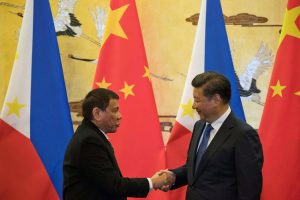(SOTW) Philippine President Denounces US

On October 20th, at a conference in Tiananmen Square, Philippine President Rodrigo Duterte declared his intentions to undergo a “separation” with the Philippine’s long-term ally, the United States. Ever since chaos has ensued.
The conference in which the Philippine president declared his intentions proceeded a meeting with the Chinese President, Xi Jinping. It is very possible that Duterte’s incentive behind his controversial announcement was to exploit the notoriously tense relationship between the United States and China. Although the United States and China are active trade partners, the two countries have clashed over ideological disparities for the past century, reaching its height during the Cold War. It is no coincidence that Duterte, knowing full well the animosity the two countries hold towards each other, would choose to express such radical anti-American sentiments in one of the countries known to be the United States’ ideological rival. Unsurprisingly, the meeting ended successfully for Duterte, gaining the Philippines a continuation in compromise over the South China Sea and over $13.5 billion in trade deals with China.
Undoubtedly, China is interested in the prospect of potentially gaining such a vital American ally. In light of the ongoing power struggle in the South China Sea, China certainly stands a lot to gain from an alliance with the Philippines. As of late, China has begun attempting to expand— or in China’s view, consolidate— its land in the South China Sea, claiming that it has a nine-dash line that demarcates its territory virtually up to the shores of the Filipino archipelago. The Philippines, as well as Taiwan, Malaysia, Vietnam, and Brunei, have all expressed outrage over this “nine-dash line” because it claims all of the islands within the South China Sea as China’s. The growing tension has provoked the United States to send out aircraft carriers and fighter jets to its military bases just in case violence unexpectedly ensues from the power struggle between the handful of countries. The Clark Air Force Base and the Subic Bay Naval Base, two of the United States’ largest military bases overseas, are virtually the only presence the US has in Asia and the best means the U.S. has to monitor the increasingly aggressive attempt of China to expand. With the Philippines no longer as a U.S. ally, China will essentially have a clear path to expansion. For this reason, it is extremely important for the Philippines to remain a U.S. ally.
To the relief of many, just two days after the deal was done with China, Duterte released a statement that the separation he referred to was not a severance of the U.S.-Philippines alliance. Instead, he downplayed it as simply a “separation of foreign policy.” He was eager to assure his people— the majority of whom, unlike their radical president, widely support the Philippine’s relationship with the U.S. — that he has no intention of breaking up the long-standing alliance with the United States. For many years before the Philippines gained their independence, Americans inhabited the archipelago and imparted their culture and values on the Filipino people. As a result, a strong cultural bond has formed between the two countries, so much so that, even after gaining their independence after world war two, many Filipinos continue to identify more with the U.S. than any of their Asian neighbors.
Unfortunately, there’s no way of telling if the masses of the archipelago are more loyal to the long-term alliance and cultural bond with the U.S. or to their charismatic new president, Rodrigo Duterte. Duterte, who is 71, is known for his “crude, hyperbolic, and contradictory” statements, according to the Los Angeles Times. Due to his impulsive comments and populist policies, Duterte has been compared to the Filipino version of the American presidential candidate of the Republican party, Donald Trump. Duterte has quite the reputation. It is common knowledge that Duterte insulted the United States president, Barack Obama, almost immediately upon taking office, calling him a “son of a whore” and telling him to “go to hell.” Not only that, but he has also repeatedly has encouraged the mass killings of drug dealers and consumers, actually winning the presidency based off of those radical statements. So far, thousands of alleged drug traffickers or consumers have been killed under his presidency and he is remorseless, standing by his statement that he would kill his own children if they took drugs. He even threatened to pull out of the UN in light of criticism amidst experts on human rights.
However, just as he noncommittally argued he was “joking” about withdrawing from the United Nations, he now, too, cannot seem to make up his mind whether he meant his denunciation of the U.S. or not. On October 26th, Duterte again spoke aggressively towards the U.S. once at a conference in Japan, asserting that “I want them out” within the next two years, referring to the American troops located on Filipino soil. To force such action to be taken would be a direct violation of the Mutual Defense Treaty, the alliance agreement between the Philippines and the U.S. in 1951. The question is whether Duterte plans to change these arrangements that have lasted for over half a century through diplomatic renegotiation or through a forceful break in the contract of the alliance. If he intends the later, the diplomatic consequences for the Philippines would be devastating. It may even lead to military conflict with the United States.
As of now, the relationship between the two countries is safe. According to the New York Times, the Philippine foreign minister, Perfecto Yasay Jr., assured that “there is no reason at this time to terminate our agreements because our national interests still continue to converge.” However, there is no telling how long this fragile alliance between the US and the Philippines will last. Much of it depends not only on the whims of Rodrigo Duterte but also on the outcome of the 2016 American presidential election.





